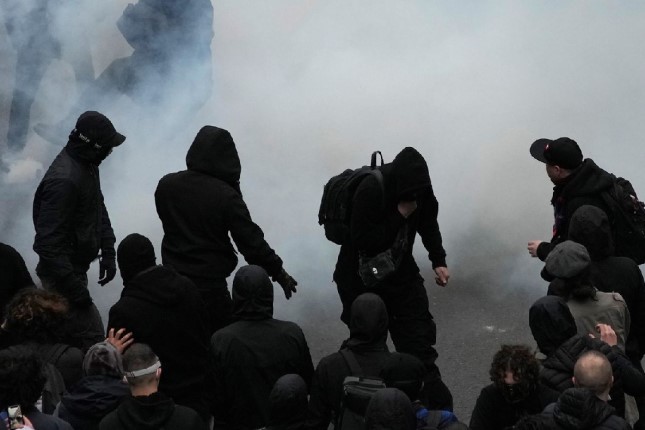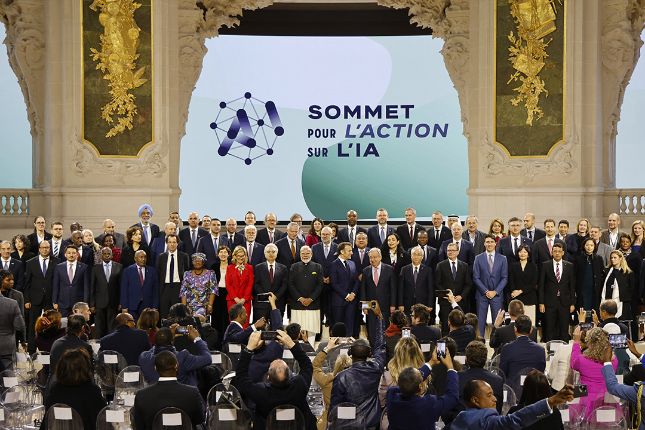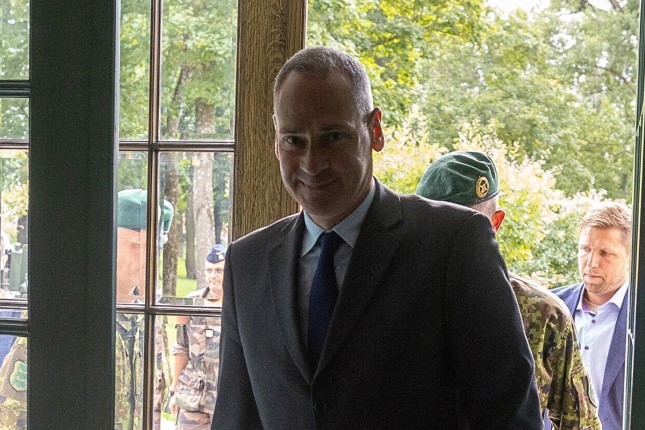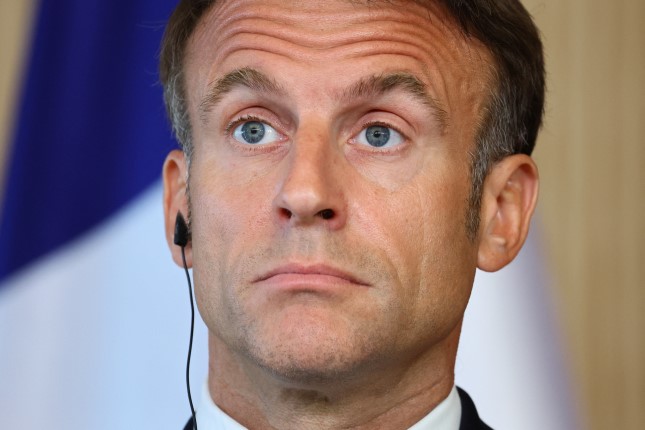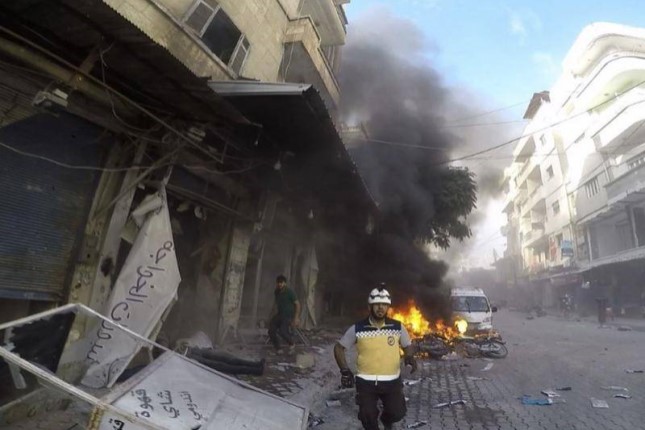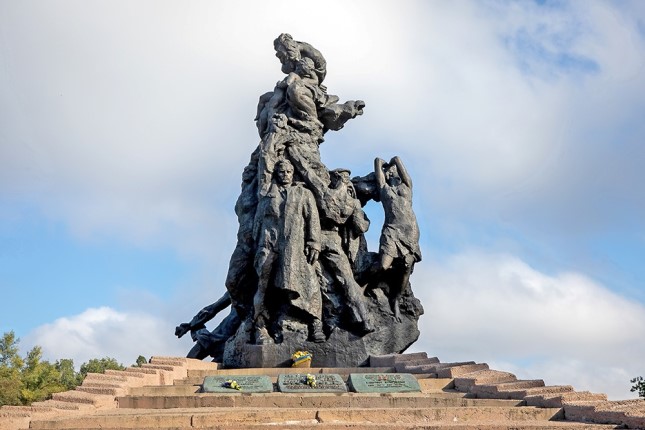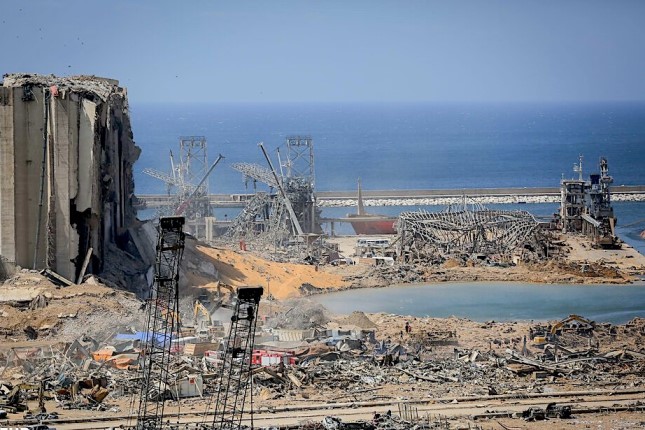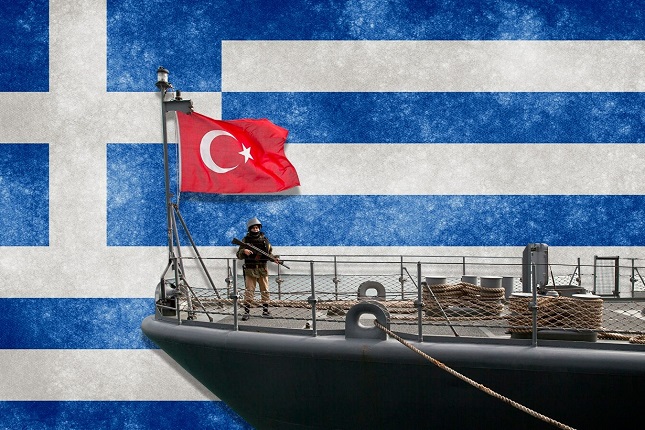He trampled underfoot the opposition of nearly 80 percent of the population who reject Macron’s cuts. Over 3.5 million people marched across France yesterday, as working class anger exploded against this naked assertion of dictatorial power.
There is no “democratic” way forward for the working class within the framework of the capitalist state, and there is no deal to be made with Macron. Aware that his imposition of the cuts would produce an eruption of anger, he mobilized the largest police deployment to date to attack the protests. With 5,000 elite, heavily armed riot policemen deployed in Paris alone, clashes erupted and fires broke out in cities across France.
There were record protests in Marseille (245,000), Toulouse (120,000), Bordeaux and Lille (both 100,000), and Lyon (50,000), according to trade union sources. Many smaller cities also saw record participation, such as Brest, Caen and Nice (40,000), Saint-Etienne (35,000), Rouen (23,000) and Laval (9,600). In Paris, the trade unions estimated that 800,000 people protested at different gatherings.
Police clearly had received instructions to attack marchers far more aggressively even than in previous days of action. In cities across the country, they systematically blocked the onward movement of marches and charged individual sectors of the march, provoking clashes that intensified over the course of the evening. Last night, the Interior Ministry reported 177 arrests, and said 149 policemen or military police had been wounded nationwide.
In Bordeaux, police fired tear gas and charged the march early in the demonstration, and clashes spread across the center of the city. In the evening, a group of protesters marched on city hall and burned down its main entrance.
Marchers in Marseille went to the nearby fuel depot at Fos-sur-Mer to give support to fuel depot and refinery workers, who are taking nationwide industrial action. A heavy police presence surrounded the facility at Fos. As fuel shortages spread across France, especially in the southeast, the government is cracking down, trying to serve requisition orders to force strikers back to work. Defying the requisition order is punishable by six months in prison and a €10,000 fine.
To help workers at the CIM fuel depot in Normandy evade requisition orders, dockers from Le Havre, France’s second-largest port after Marseille, have placed shipping containers across the entrance to the facility, blocking it off.
In Rouen, an investigation has been opened after a police stun grenade fired at a group of striking teachers tore part of a woman’s hand off.
In Rennes, police fired two water cannon and tear gas in streets and squares across the city. Nathalie Appéré, the city’s PS mayor, sent an open letter to Macron that reflects fear growing in layers of the ruling class that he is losing control. She said: “Day after day, violence is repeated in our streets, we see scenes of chaos. Day after day, police are mobilized in large numbers. But it is no longer enough to protect our city... I call on the President of the Republic: You have the power to stop this downward spiral.”
Similar points were made by Jean-Luc Mélenchon, the head of the Unsubmissive France (LFI) party allied to the social-democratic Socialist Party and the Stalinist French Communist Party. He appeared last night on TF1 television, begging Macron to defuse the situation by giving the state bureaucracy time to study his cuts.
Mélenchon said, “Mr Macron, withdraw your cuts and give the matter over to the Administrative Council for Social Security. From 2027 to 2029 the pension budget will be balanced, so it’s a matter of dividing things up? People do not need to work two years more.”
The explosive conflict between the working class and the capitalist state will not be resolved by the French state administration, whatever the arguments of Mélenchon. Far broader class forces have entered the fray. Macron, having publicly boasted in his TV interview Wednesday afternoon that he is willing to be unpopular, is leading a class war of the financial oligarchy and the riot police on the workers. And the workers, having risen up against Macron’s dictatorial measures on pensions, are entering into a direct confrontation with the capitalist state.
In Paris, police charged demonstrators in the main march early on in the afternoon. Clashes with protesters continued across the center of Paris throughout the evening, with riot police totally sealing off Opera Square during the evening, kettling large numbers of protesters inside. Mobile teams of military police appeared from the subway to fire tear gas into the crowd, which responded with chants of, “Everyone hates the police.”
For the first time during protests against Macron, riot police in Paris also deployed attack dogs against protesters.
Certain reports indicate that constant street fighting with large numbers of people is beginning to exhaust the riot police. Some units were seen standing and resting in the street; in one instance, separate units lost overall coordination and fired tear gas at each other.
In Paris, the WSWS spoke to Maia, a high school student, on Macron’s imposition of the cuts without a vote despite overwhelming popular opposition. She said, “We are not in a democracy. We have protested many times since the beginning. So now what this means is that basically they dictate their laws every time and they are not afraid of losing elections, so they can do anything. It will be too easy.”
Fanny and Ninon, two university students, also denounced Macron’s imposition of the cuts without a vote: “It is shameful, it is an attack on democracy... At no point have the people been listened to, it has been treated with contempt. One has the feeling that the only thing that bothers him is that the trash is not being picked up” because of the garbagemen’s strike.
Ninon spoke of the growing anger among youth as the capitalist state systematically shuts off every avenue within the existing political system for the masses to advocate for policies in their interests.
She said, “It has been several years that we have gone on protests, we feel it is necessary. Each time we have had this same impression of contempt on the one side, and of enormous anger that has existed for a long time on the other. We use every democratic means at our disposal and they do not work, so questions are posed. We play by the rules of that game, but on the other side, they do not.”
Fanny pointed to the link between Macron’s antidemocratic policies and the 100-billion-euro fortunes amassed by France’s leading billionaires. She said, “For me, that should be illegal. It is impossible to amass that much money without at some point having exploited someone. These are astronomical sums; it is really sick.”
Yesterday evening, the all-trade union alliance that called yesterday’s protest met to call for another national day of action, this time for March 28. These bureaucracies, whose leaders are in discussions with Macron on the pension cuts and the scheduling of protests, are terrified that they might lose control of protests and strikes. They have no intention of fighting to bring down Macron, but call actions to try to keep control of protests in an emerging, objectively revolutionary crisis.
Workers and youth cannot fight Macron within the political straitjacket imposed by these bureaucracies. It is critical to organize the working class in rank-and-file committees, independent of the union bureaucracies, that can coordinate strikes, protests, and actions to defend workers against police-state repression not only in France, but across Europe and internationally. This is directly related to the question of what strategy and perspective to employ against Macron’s police-state regime.
Since there is no deal to be reached with Macron, the way forward is a struggle to transfer power from the discredited institutions of the capitalist state to the independent organizations of struggle built by the working class, in a socialist revolution fighting to build the United Socialist States of Europe.
Source: World Socialist Web Site.
